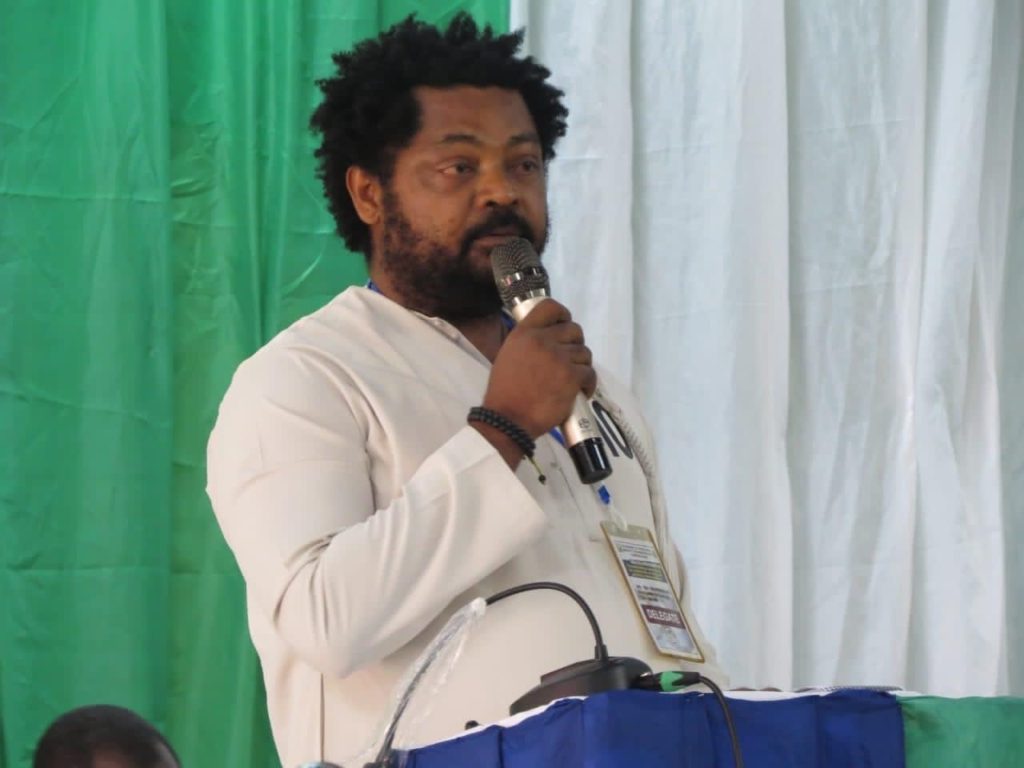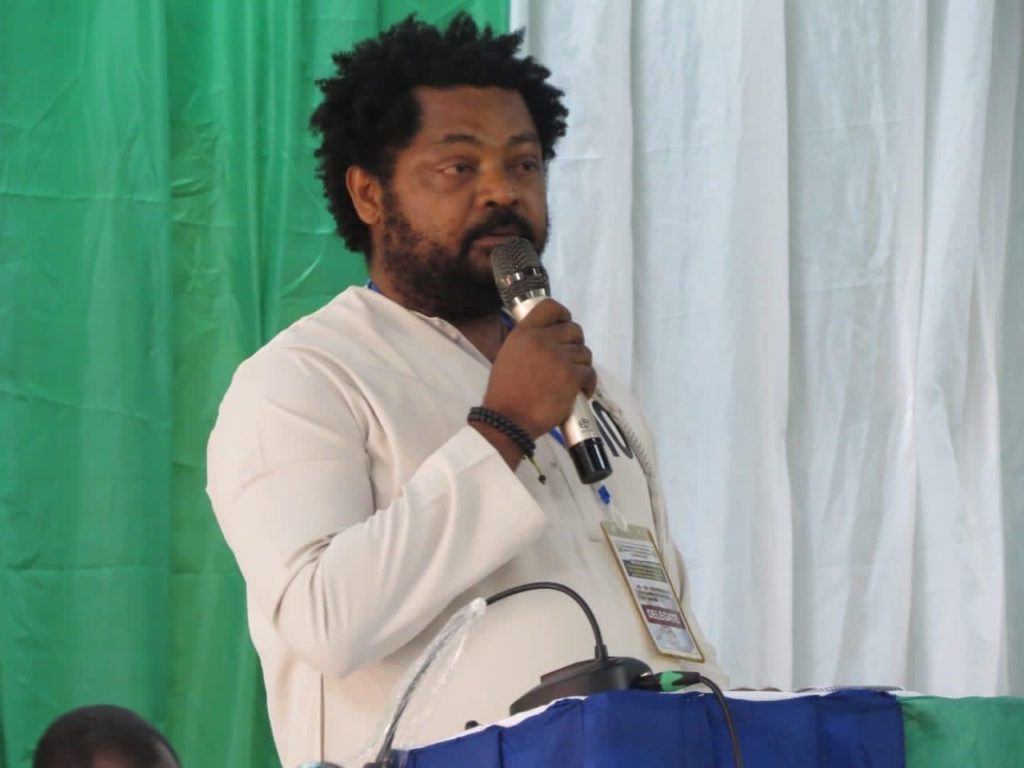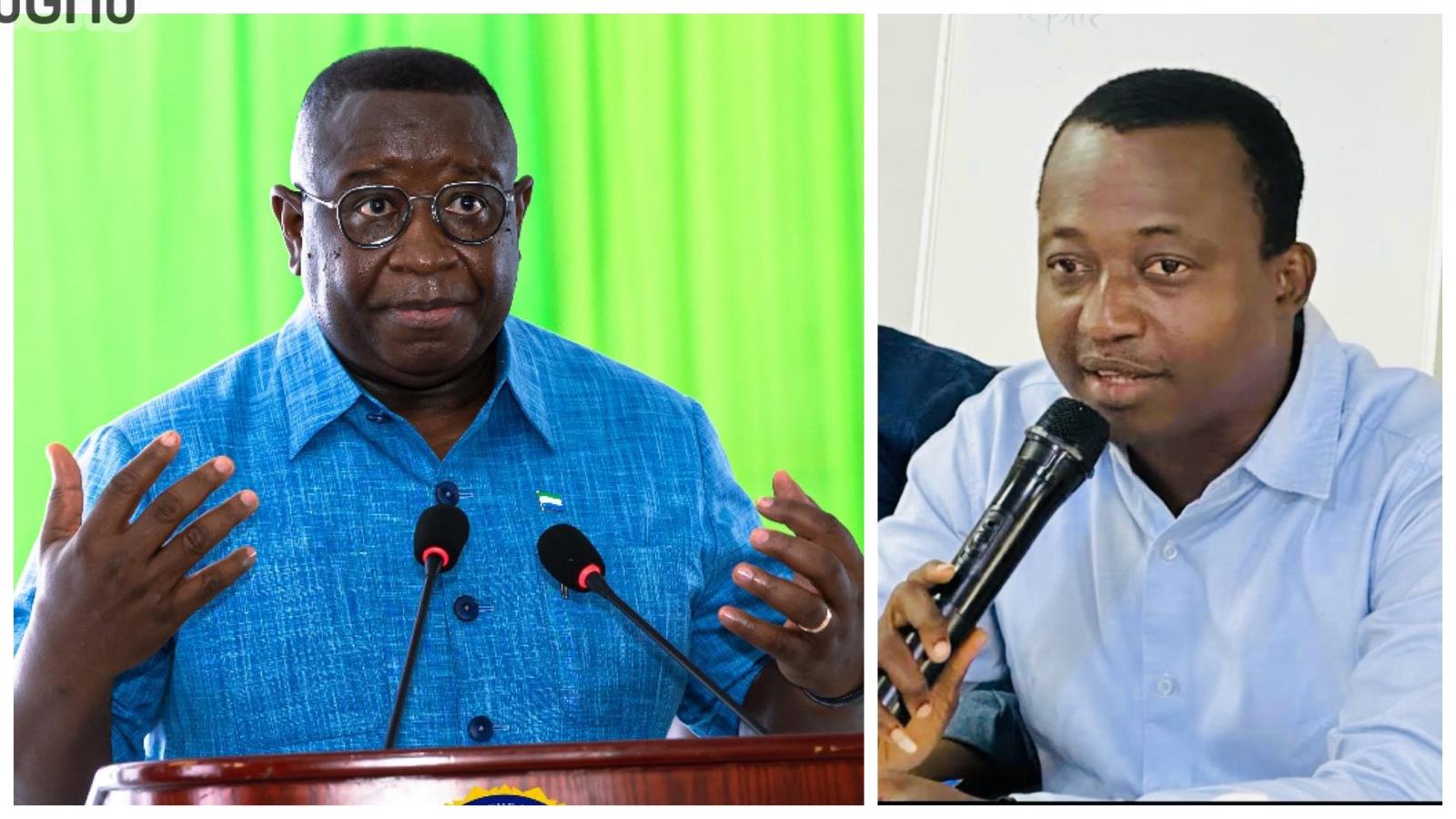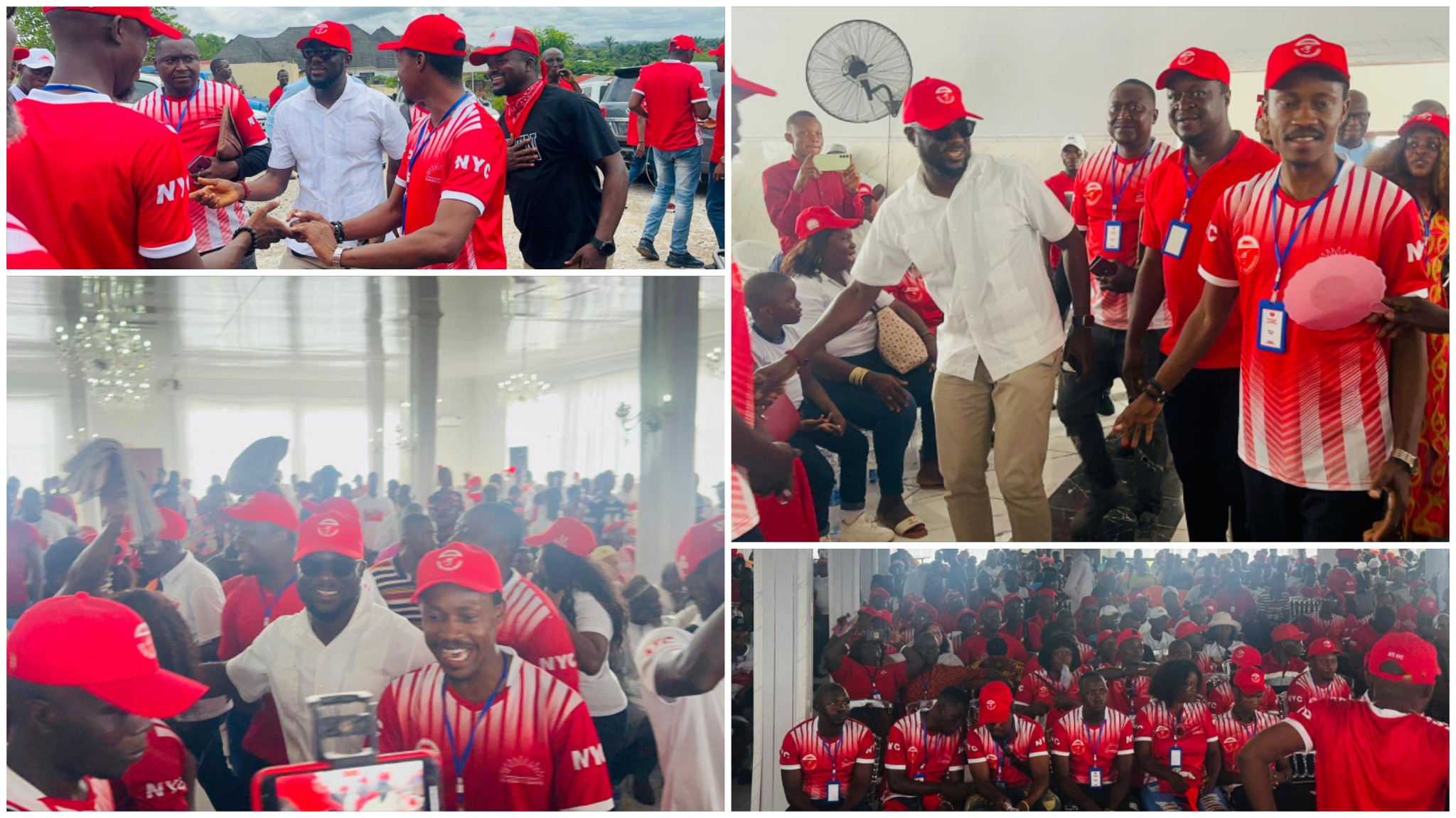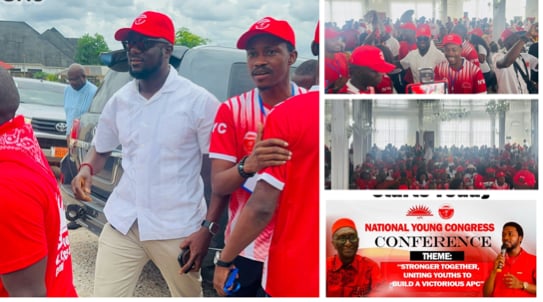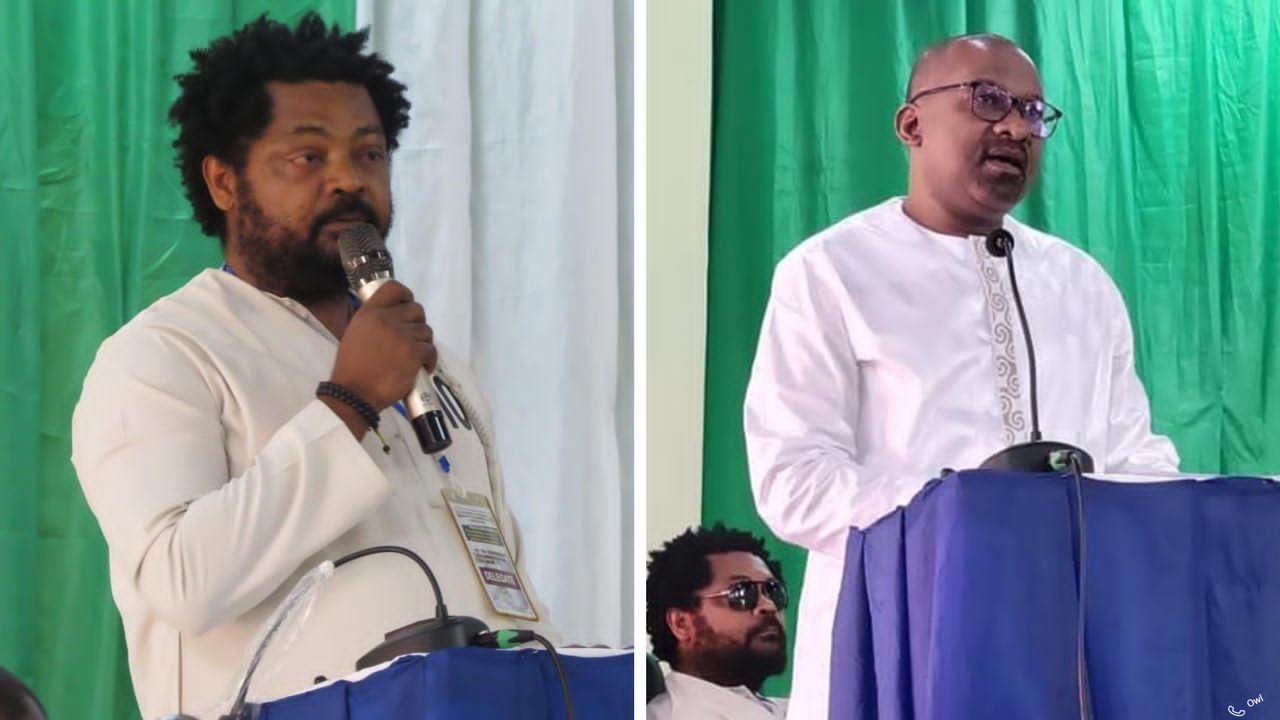
Statement by SLAJ President, Ahmed Sahid Nasralla, at the 3rd Annual Ministry of Information and Communications’ (MIC) CSO and Media Dialogue
Theme: Consolidating Democracy: Our collective, shared and patriotic responsibility
Date: 24th -27th November 2022
Venue: Kenema District Council Hall
Time: 9;30am
Opening courtesy.
(The Parliament of Sierra Leone has just enacted the much publicised GEWE Bill but His Excellency the President has not yet signed it into law. That is the reason you are seeing an all-male high table- laugh).
Let me start by thanking the MIC, especially the dynamic Minister Mr Mohamed Rahman Swaray, for organising this CSO and media engagement for the third consecutive year. This forum brings the Government of Sierra Leone (GoSL) and its agencies, CSOs and the media to track delivery of manifesto promises and provides an opportunity for the media and CSOs to interrogate activities of critical agencies of the GoSL.
Over the last three to four years, SLAJ has been collaborating with the MIC to address the challenges facing the media because we believe the GoSL has a sacred responsibility to support the growth of independent and thriving media to help our democracy function well.
This collaboration should in no way be misconstrued as SLAJ selling out journalism or the GoSL buying out journalism. We are not selling, and the GoSL is not buying.
At no point in the period of this collaboration has anyone in GoSL called us to influence our work or position on national issues that we feel very strongly about.
This collaboration is partly us working together to fulfilling the collaborative role of the media- to work with relevant agencies of government, and agencies outside of government, to promote the media development and, by extension, the national development agenda.
We are encouraged that the media generally continues to perform the radical role of scrutinizing this collaboration, and holding the GoSL and its agencies to account on a daily basis. That one, we (SLAJ) don’t have control over. We don’t determine the editorial policies of the media houses operating in the country nor do we tell them what to report or not report. We absolutely don’t have that power.
There are many positives that have come out of this collaboration, and I think the foundation upon which we are together building a new media landscape is the historic repeal of the criminal libel law; an obnoxious law that took us more than 50yrs to delete from our law books.
There is free media here.
There is freedom of information here (the recent MCC scorecard puts this at 98%).
There is media pluralism here that can probably not be compared to any country in the world.
According to UNESCO, one in every 5 journalists in the world is killed every year in the line of duty. We hope and pray that we will never ever contribute to that horrible statistics.
No journalist is in jail in Sierra Leone for what they publish or broadcast or tweet.
Our usual visits to the CID almost every other week are no more. We have made the biggest leaps in the World Press Freedom Index two years in row since the repeal of the criminal libel law in 2020. The GoSL saw the need to support SLAJ with an annual subvention, which was doubled last year.
Because of all of these achievements Sierra Leone was encouraged to join the Global Media Coalition- a high level platform where governments engage and peer review their commitments to enhancing freedom of expression and free media. We have had initial meetings with the Coalition to understand their work, their objective and how SLAJ and the GoSL could benefit from their interventions.
And, there is the media viability and investment conference held in June of this year. Progress made so far after that historic conference has been very encouraging. Sierra Leone has for the first time being listed as one of 17 countries in the world to benefit from the International Fund for Public Interest Media (IFPIM). In preparation for that intervention, we have worked with support of all the stakeholders, including GoSL, under the platform of the Media Reform Coordinating Group (MRCG), to begin to put the structures in place.
We have established our own National Fund for Public Interest Media (NFPIM). We have established a Multi Stakeholders Board (MSB) and a Technical Working Group (TSG) to administer the fund.
A project proposal has been submitted which, when approved, will see Sierra Leone benefit from a 100 thousand United States Dollars from the international fund. 50 percent of that will go towards setting up of the structures, which we have already started putting in place, and the other half will be a grant to NFPIM. We also expect a counterpart funding from the GoSL as one of its commitment during the conference.
This will be the first time in the history of the media in Sierra Leone that a locally-owned-and-managed Fund will be giving out small grants to media houses, or groups of journalists, that are committed to doing public interest media- embarking on in-depth and investigative reporting on governance issues of accountability, transparency, and service delivery at the local and national level.
Meetings of the MSB and TWG have commenced to discuss the legal status of the fund; finalise the criteria, guidelines, and tools to operationalise the fund. A workshop on drafting the definition of Public Interest Media within the context of Sierra Leone will soon be held.
By December 2022 to January 2023 we hope that some form of activity will commence.
However, the conference also challenged the media in Sierra Leone to review their governance and leadership structures to attract this much needed investment, ensure accountability and sustainability.
The media should also explore new business and revenue-generation models and move away from the traditional way of doing things which is now very old-fashioned. That the GoSL and its partners should work to provide scholarship, training and capacity building opportunities for journalists.
That Government should take affirmative action to promote community media and the public broadcaster- Sierra Leone Broadcasting Corporation (SLBC). That local councils should support community media to improve information provision as well as civic engagement around local development policies and initiatives.
That the GoSL should introduced new tax incentives and waivers for especially community media- reduce taxation on equipment, and the raw materials used by the print media. As I speak, the prices of materials used by the print media for example (newsprints, foils, ink, etc.) have more than tripled and it is very difficult period for newspaper owners doing business.
That the SLBC’s governance and fundraising models should be reconsidered with a view to giving the public broadcaster greater independence and financial freedom to improve its infrastructure, enhance quality content and devise longer term business plan.
That a national policy on advertising should be introduced.
The GoSL should introduce regulations for fair and transparent allocation of public sector advertisement using criteria such as compliance with NRA, NASSIT, IMC, NATCOM requirements.
There is the issue of payment for government advertising. The GoSL is the biggest advertiser to the media and is also the biggest debtor because invoices for most of the adverts placed by government agencies are not honoured and they end up being written off as bad debts by the media. So, we can work out a system to ensure advert invoices are honoured 50 percent up-front and the other 50 percent after publication not later than one month.
Or we can work out a plan with the Ministry of Finance to deduct such payment from source.
Part of the recommendations from the conference also urged the GoSL to address gender imbalance in the media industry in Sierra Leone. What better body to facilitate that than SLAJ? We have set up a Gender Advisory Panel in that regard to help us research the status of gender representation in the media.
Furthermore, we need to encourage women entrepreneurs to enter into media development.
The Honourable Vice President, colleagues, but there are still outstanding issues. We are still working with the Minister of Lands on locating a suitable plot within central Freetown for the construction of a befitting Secretariat/Headquarters for SLAJ. It is almost impossible because there are probably no more state lands in the areas we prefer but we will continue to work with the minister and his team to ensure this outstanding promise of His Excellency President Bio is fulfilled before the next elections.
Mr. Vice President, here in Kenema town, the construction of the office building for SLAJ East is underway and about 40 percent complete. We appeal to members of Government who hail from the region to join hands and support the completion of the building so that journalists in the region would have a place they will proudly call their own. Equally, we call on the corporate community to also come onboard and support this worthy initiative.
When you support the media, you are supporting democracy and by extension peace and stability which are prerequisites for the functioning of the state and for businesses to operate and thrive. In June next here SLAJ will be here in Kenema for its annual general meeting ahead of the public elections and we hope to officially open the SLAJ East office by the Grace of God.
Mr. Vice President, one of the critical challenges we will have for the coming public elections is information disorder- fake news, disinformation, hate speech, and political propaganda. SLAJ is putting modalities in place to work with Elections Monitoring Bodies and international partners to promote information integrity during the elections and ensure the citizens have the correct information to be able to make informed decisions. If we give them the wrong or misleading information, they will definitely make wrong decisions and the likelihood for violence will be heightened.
In addition, under the umbrella body of the National Political Debates Committee we are working on promoting the culture of debate in our body political through the organisation of presidential debates. We want our politicians to dialogue and fight with words, not with fists. Let us encourage a market place of ideas and let the people exercise their right to buy the idea that appeals to them. In January 2023, we are beginning this process with the organisation of three debates: women, youth and PWDs in political parties, supported by the National Democratic Institute.
Finally, Mr Vice President, we have talked enough about the media. Let me now convey a message from ordinary Sierra Leoneans: THINGS ARE HARD. It’s really difficult. The standard of living is going higher. We know it’s a global crisis, and we know the GoSL is doing a lot to cushion the effects through various incentives and subsidies but it is like they are doing nothing. Salaries of the majority of the working class have remained firmly constant while prices of goods and services continue to soar by the day. We need to do more.
I thank you all for your attention.

